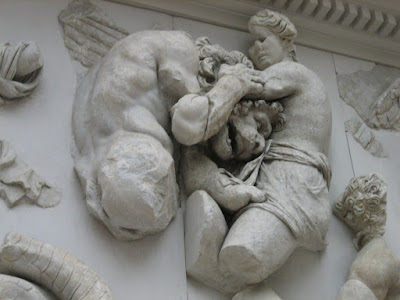Dirty and dusty

In most liturgical services on this day, the sign of the cross using the ash from the previous year's Palm Sunday is made upon the foreheads of worshippers. It is called a sign of penitence and mortality. That is, it symbolises that we are both broken and dying, flawed and finite, fragmented and fragile, dirty and dusty.
As the mark is made, these words are spoken:
Remember, o man/woman/mortal, that you are dust, and to dust you shall return. Repent and believe the good news.How to relate our mortality to our sinfulness is an important issue in Christian theology. Are we dying because we sin? Or do we sin because we are dying? Which is the more fundamental problem and how does the good news address each?
The Ash Wednesday quote above gives one way into this discussion. Notice that while both mortality and sinfulness are referenced, the appropriate response to each differs. We remember our mortality; we repent of our sins. Our mortality is not itself a fault, but part of our creaturely existence. We receive the breath of life, it is never ours to claim or secure, our life is always dependent upon a source beyond us. The call to remember this is the call to relinquish control over our deaths, to relinquish the demand that I must be kept alive at all costs, and so to discover the freedom that comes from giving space in my life to projects other than survival.
 Yet we are to repent of our sins, to turn from our self-obsession and to discover joy (and pain) in meeting and loving others beyond the echo-chamber of the self. This repentance will make no sense unless it is accompanied, enabled and completed by believing the good news. Only the good news of the risen Jesus liberates us from the patterns of false behaviour that diminish our capacity for life and love. That is why the sign that is made in ash is that of a cross. The cross symbolises the good news of liberation: not liberation from being dust and ashes (the sign of the cross is itself made in ash and God's saving work amongst us in Christ was as dust and ashes), but freedom from guilt at our dirty lives, freedom from sin and its false dreams, freedom from despair and so freedom to be truly human.
Yet we are to repent of our sins, to turn from our self-obsession and to discover joy (and pain) in meeting and loving others beyond the echo-chamber of the self. This repentance will make no sense unless it is accompanied, enabled and completed by believing the good news. Only the good news of the risen Jesus liberates us from the patterns of false behaviour that diminish our capacity for life and love. That is why the sign that is made in ash is that of a cross. The cross symbolises the good news of liberation: not liberation from being dust and ashes (the sign of the cross is itself made in ash and God's saving work amongst us in Christ was as dust and ashes), but freedom from guilt at our dirty lives, freedom from sin and its false dreams, freedom from despair and so freedom to be truly human.On Ash Wednesday, Christians are marked as dirty and dusty, but the shame of the dirt and the frustration of the dust are placed within the hope of the cross.
Much more can be said on each of these topics, but let me finally introduce one further idea. While being exhorted to remember our mortality - that we will return to dust - we are also encouraged to remember our origin and identity- that we are dust. Like Adam, we are from and of the earth ('adamah in Hebrew). Being dusty means not only that our life is received as a gift, but that we exist as a member of the community of creation, in solidarity with the rest of the created order. Although we are often quick to lay claim to human uniqueness, part of lenten penitence is re-membering ourselves within this larger sphere. This is both dignity and frustration. Dignity because we too belong to the ordered material world over which God declared his blessing. Frustration because we share with all created things a present "bondage to decay". But our origin and destiny are bound together with the non-human world. Thus, to be smeared with cinders is to be humbled, and yet simultaneously to discover in that humility a properly human and creaturely glory.















